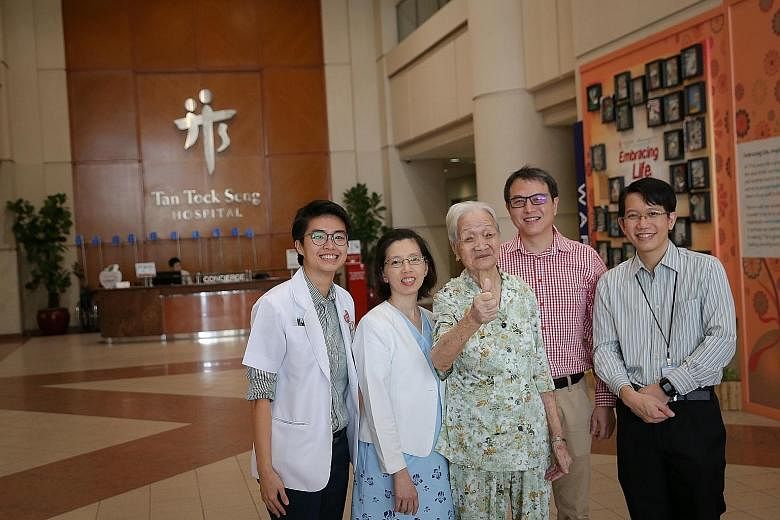When Madam Cheng Hui Hoang went for surgery to remove a cancerous tumour in her colon last month, she did not have to fast, nor was she forced to stay in bed after the operation.
Today, the 95-year-old is back on her feet - and it is no coincidence. Scores of patients in Singapore have been recovering quicker and facing fewer complications after surgery because some hospitals have done away with traditional ways of managing patients.
Instead, a new set of clinical protocols has been put in place at hospitals such as Tan Tock Seng Hospital (TTSH), National University Hospital (NUH) and Changi General Hospital in recent years. It has been tried on colorectal patients to start with and after encouraging results, there are plans to widen the protocols to other disciplines.
The system, called Enhanced Recovery After Surgery (Eras), is based on scientific evidence which showed that fasting and bed rest before and after surgery, for example, could hamper recovery, instead of helping it.
Madam Cheng could continue taking liquids and two hours before the procedure, she was given a special drink to regulate her sugar level.
When she woke up after the three-hour operation, she was encouraged to move around.
-
How they compare
-
Traditional care
Before surgery
Fast from midnight.
After surgery
Complete rest in bed for days. Not allowed to eat or drink until patient passes gas or motion.
Eras system
Before surgery
Carbohydrate drink given two hours before procedure.
After surgery
Sit up and walk after a few hours. Can eat and drink.
Under the old system, she would have had to avoid food and drinks from midnight before her surgery, and remain bed-bound for several days after.
But scientists found that fasting before surgery could cause anxiety in patients and contribute to insulin resistance. This could raise risks of complications after surgery.
Staying bed-bound post-surgery could weaken muscles, said Dr Doris Ng of TTSH's gastroenterology and hepatology department at a media briefing yesterday.
At TTSH, where Madam Cheng was treated, the new system started in April has shown good results.
A study of 78 colorectal surgery patients treated using Eras and 298 treated under traditional protocols found that the average length of stay dropped from 10.6 to 7.9 days with the new system.
The percentage of patients suffering surgical complication has also more than halved from 17.1 to 7.7 per cent. The rate of re-admission has also been reduced from 8.1 per cent to 1.3 per cent.
TTSH estimates that it could result in $2,268,000 in cost savings for colorectal surgery patients every year, using patients' fees for A class.
"Because we have a shorter length of stay, the faster turnover enables us to provide care for more patients," said Dr How Kwang Yeong, a consultant at TTSH's department of general surgery.
"Against the backdrop of an ageing population and a lack of beds, Eras is going to be a game changer in the healthcare scene," he said.
Next year, the system will be introduced to other operations, such as those involving stomach and liver.
At NUH, where the system was introduced in January last year, improvements in post-surgery complication rates and re-admission rates among some 360 colorectal surgery patients have also been reported, said Dr Cheong Wai Kit, head of NUH's colorectal surgery division.
The system has been introduced to obstetrics and gynaecology surgery at NUH, and there are plans to introduce it to other disciplines such as urology and orthopaedic as well.

